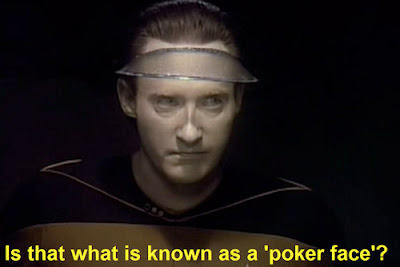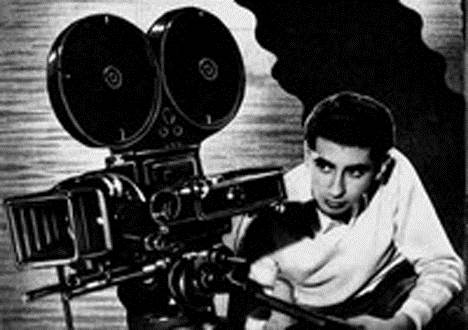Archive
Daily Archives: November 29, 2012
Daily Archives: November 29, 2012
 |
| Lt. Commander Data |
There will be a new release of the famous episode from Star Trek: The Next Generation, “The Measure of a Man.” That’s the episode where there’s a trial to determine if Data deserves to be treated with right equal to humans and Vulcans and other sentient species, or if he should be treated as property because he’s an android.
I heard the news from Out of the Darkroom: Horse Keeping:
My friend Melinda Snodgrass arrived yesterday from New Mexico because there’s a nation-wide showing of her famous episode of Star Trek: The Next Generation tonight (at theatres near you all, actually) and we’re going to the screening in Century City with her. “The Measure of a Man” is based on the Dred Scott decision, but it has a happier ending. The screening will be of a restored version–the original screenplay was too long for a one-hour slot, but the editors gave her a video tape without the cuts that were made. Because she had this version, it will appear in the new Blu-ray release.
I can’t wait to see the uncut version! I hope it will be made available for sale online. Here we see Data’s sense of humor (from a different episode):
Here’s one of the famous scenes from Measure of a Man:
| PICARD: | Do you like Commander Data? |
| MADDOX: | I don’t know it well enough to like or dislike it. |
| PICARD: | But you do admire him? |
| MADDOX: | Oh, yes it is an extraordinary piece of . . |
| PICARD: | . . of engineering and programming, yes you have said that. You have dedicated your life to the study of cybernetics in general and Data in particular. |
| MADDOX: | Yes. |
| PICARD: | And now you intend to dismantle him. |
| MADDOX: | So I can learn to construct more. |
| PICARD: | How many more. |
| MADDOX: | As many as are needed. Hundreds, thousands if necessary. There is no limit. |
| PICARD: | A single Data, and forgive me Commander, is a curiosity, a wonder even. But thousands of Datas isn’t that becoming a race. And won’t we be judged by how we treat that race? Now tell me Commander, what is Data? |
| MADDOX: | I don’t understand |
| PICARD: | What is he? |
| MADDOX: | A machine. |
| PICARD: | Are you sure |
| MADDOX: | Yes. |
| PICARD: | You see he has met two of your three criteria for sentience. What if he meets the third, consciousness, in even the slightest degree? What is he then? I don’t know. Do you? Do YOU [turning to the judge]? Well that’s the question you have to answer. Your Honor, the courtroom is a crucible. In it we burn away irrelevancies until we are left with a pure product, the truth, for all time. Now sooner or later this man (MADDOX) or others like him will succeed in replicating Commander Data. Your ruling today will determine how we will regard this creation of our genius. It will reveal the kind of people we are, what he is destined to be. It will reach far beyond this courtroom and this one android. It could significantly redefine the boundaries of personal liberty. Expanding them for some, savagely curtailing them for others. Are you prepared to condemn him, and all those who come after him, to servitude and slavery? Your honor, Starfleet was founded to seek out new life — well there it sits. Waiting. You wanted a chance to make law. Well here’s your chance, make it a good one. |
| LAVOIR: | It sits there looking at me but I don’t know what it is. This case has dealt with questions best left to saints and philosophers. I am neither competent or qualified to answer that. I’ve got to make a ruling, to try to speak to the future. Is Data a machine? Is he the property of Starfleet? No. We’ve all been dancing around the main question: Does Data have a soul? I don’t know that he has. I don’t know that I have. But I have to give him the freedom to explore that question himself. It is the ruling of this court that Lieutenant Commander Data has the freedom to choose. |
1. Are names, places and logistical details consistent? Decide the correct name and spelling and keep the list in a Story Bible. These, you can correct as you go along.
2. Are the major plot questions and each of the subplot questions answered by the end?
3. Are all major characters accounted for at the end?
4. Are all the red herrings deflected and the true revelations revealed?
5. Are villainous characters given their just desserts?
6. Is the ending clear, not ambiguous? (Unless you’ve made it ambiguous on purpose, in which case, THAT should be clear.)
7. Are there any “plot promises” which you’ve forgotten to redeem? (Say the hero promised a minor character something and you meant him to keep that promise but forgot to mention it again.)
If you prefer these Tips as an ebook you can buy it here for $0.99:
 |
A screenplay goes through many stages, from storyboard to treatment to draft script to shooting script. Not all these terms are useful for novel writers. (Obviously a “shooting script” is not relevant, although it has its equivalent perhaps in the “gallies.”)
I think some screenwriting terms and traditions are useful for novelists… the storyboard and the beat sheet, for instance.
Another useful term is scriptment. A scriptment is a halfway between a treatment (a summary without dialogue) and a full script draft.
What would a novel scriptment be? It would be half-way between an Outline and a Draft.
I like this term because to me “draft” implies a novel that is complete but inelegant. It needs editing and polishing, maybe even cutting scenes or adding or moving scenes, but it’s a readable novel. An outline is just a skeleton. But if you have your novel blocked out scene by scene, with a lot of the dialogue included, in the correct tense and PoV, this is the novel equivalent of a scriptment.
If you know how your scriptment unpacks into full draft, you can estimate the correct word count for your novel. For instance, my scriptment for October Knight is now finished. It’s about 30,000 words of scriptment, with some of that unpacked into draft already, coming to about 40,000 words right.
Obviously I haven’t “won” NaNoWriMo officially (although if I include my blog posts and my NaNoWriMo Tips, I have written comfortably over 50,000 words this month…) but what I do have is an extremely useful and solid foundation for a novel…one that will require far less time in revision than previous drafts I’ve done before I knew how to extensively plan my novels before I wrote them.